Our Structural Heart Disease training provides advanced and thorough preparation for clinical and academic physician-leaders in the rapidly expanding field of structural interventional cardiology. All training takes place at the main Lebanon campus of Dartmouth Hitchcock Medical Center, a tertiary referral center centrally located on the border of New Hampshire and Vermont and serving the Northern New England region.
Curriculum procedures
Interventional procedures
- Transseptal puncture and intracardiac echocardiography (complex diagnostic hemodynamic cases as well as guiding interventions)
- Transcatheter Aortic Valve Replacement with Edwards THV, Medtronic THV, and NAVITOR THV.
- Transcatheter Mitral Valve Repair (Mitraclip and PASCAL) and Replacement
- Transcatheter Tricuspid Valve Replacement (EVOQUE)
- Left atrial appendage closure (WATCHMAN and Amulet)
- PFO/ASD closure (Cardioform, Amplatzer)
- Mitral valvuloplasty
- Aortic valvuloplasty
- Transcatheter Pulmonary Valve Replacement
- Paravalvular leak closure (aortic and mitral position)
- Advanced LV support (Balloon pump, Impella, ECLS-CardioHelp)
- Renal Denervation (SPYRAL)
- Ongoing advanced coronary work (CTO, multivessel disease) with potential opportunity for independent performance of PCI (at the discretion of catheterization laboratory director)
- Partnerships available between interventional attending physicians and IR (venous stenting) and pediatric cardiology (PDA closure, coarct stenting, pulmonary valvuplasty, etc.)
- Participation in >15 clinical trials in the cardiac catheterization lab including M3 ENCIRCLE, CLASP II TR, PROGRESS CAP, LAPLACE, COMPLETE TAVR, SIMPLAAFY, SPIRAL Affirm
Complex hemodynamic studies (examples)
- Constriction versus restriction versus severe tricuspid regurgitation
- Severe pulmonary hypertension due to valvular heart disease and resultant operability
- Left atrial hypertension
- Exercise-related diastolic dysfunction
- Low output, low gradient, preserved EF aortic stenosis
Academic work
Additional highlights of our program include ample research opportunities both within the hospital and through The Dartmouth Institute for Health Policy and Clinical Practice. Three research tracks focused on Structural Heart Disease currently exist: 1) Complex Invasive Hemodynamics; 2) Shared Decision Making and 3) Outcomes Research (through the Northern New England Cardiovascular Disease Study Group).
The Structural Heart Disease fellow will be expected to partner with an attending cardiologist to publish a minimum of three (3) case reports in the field of structural intervention or invasive hemodynamic assessment. In addition, the Structural Heart Disease fellow will be expected to complete one original research manuscript utilizing one of the following: 1) description of complex hemodynamic assessment of small group of patients with structural heart disease; 2) contribution to research on a decision aid to support shared decision making in structural intervention (in collaboration with The Dartmouth Institute for Health Policy and Clinical Practice); 3) focused study of Structural Heart Disease outcomes using available databases (i.e. Northern New England Cardiovascular Disease Study Group). Expected academic outputs may include presentations, abstracts at national meetings, and manuscripts. Statistical support is available through Dr. Jeremiah Brown and The Dartmouth Institute for Health Policy and Clinical Practice.
Structural fellows are expected to gain early competence of Witt/XPER Flex (hemodynamic system) and 3Mensio and be able to select, save, and share images with team members for both research and clinical purposes.
Clinical work
Catheterization laboratory
Structural Heart Disease fellows will participate in coronary interventions when not involved in the above work. STEMI call will be shared with other interventional fellows, as well as trained technical staff, to maintain skills. The fellow will undergo formal evaluation mid-way through the year to assess readiness as an independent coronary operator at Dartmouth Hitchcock Medical Center, with the exception of STEMI call.
Procedural independence will be gained through increasing leadership in procedural planning and execution. Fellows are expected to assume a leadership role early in the year, with a comprehensive review of patients undergoing structural intervention or hemodynamic assessment and detailed procedural plans shared with both the attending and the technical staff. Fellows will participate in generating reports and communicating with referring physicians as appropriate.
Structural Heart Disease fellows will be expected to participate with the echocardiographic attending physicians in the assessment of structural and valvular heart disease requiring intervention, including TTE, TEE, and interventional TEE. The fellow will not act as a primary operator; focus will be on expanding the skillset needed to be a successful catheterization operator.
Clinics and consults
Fellows will see patients in Heart and Vascular Center clinic (up to one day per week). There will be a consistent ad hoc need for evaluation of patients in clinic and on the inpatient service with valvular and structural heart disease, and structural fellows will be asked to perform hospital consults (when not engaged in a case) for these evaluations. These clinic visits and consults will be staffed by a structural attending, with a focus on physical exam, imaging, patient selection, and procedural planning.
Inpatient service
Clinical skills will be maintained on the inpatient ward with the care of critically ill cardiac patients. Structural fellows will serve a minimum of three weeks as the Housestaff Teaching Attending, taking care of patients in the CCU and cardiac step-down unit. A total of 20% of the fellowship will be devoted to the role of junior attending.
Dartmouth conferences and local public speaking
Structural fellows will present cases at Morbidity and Mortality (M&M) conferences, Valve Conference, and will help lead Structural/Hemodynamic conferences. Attendance at morning TAVR meetings is required, with growing independence to lead discussions of cases as patients are staffed by the structural fellow in consultation and as the fellow’s skill set grows in imaging and procedural planning. Fellows will be expected to give a minimum of two talks on structural heart disease in either an internal forum, at referral practices, or at regional or national meetings. These presentations will be reviewed in detail with structural attending physicians beforehand and will go through an editing and teaching process, including videotaping and personal review of the presentation.
National conferences
Funding will be provided to attend one conference, with a recommendation for ACC, AHA, or a valvular heart disease conference. Fellows will be strongly encouraged to submit research abstract(s) to selected conferences.
